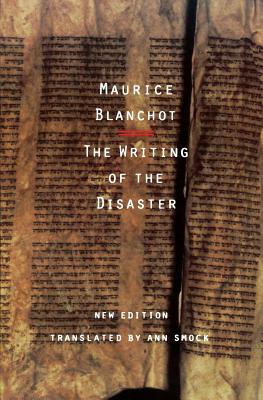The Writing of the Disaster

The Writing of the Disaster
Modern history is haunted by the disasters of the century--world wars, concentration camps, Hiroshima, and the Holocaust--grief, anger, terror, and loss beyond words, but still close, still impending. How can we write or think about disaster when by its very nature it defies speech and compels silence, burns books and shatters meaning? The Writing of the Disaster reflects upon efforts to abide in disaster's infinite threat. First published in French in 1980, it takes up the most serious tasks of writing: to describe, explain, and redeem when possible, and to admit what is not possible. Neither offers consolation. Maurice Blanchot has been praised on both sides of the Atlantic for his fiction and criticism. The philosopher Emmanuel Levinas once remarked that Blanchot's writing is a language of pure transcendence, without correlative. Literary theorist and critic Geoffrey Hartman remarked that Blanchot's influence on contemporary writers cannot be overestimated.
PRP: 279.00 Lei
Acesta este Prețul Recomandat de Producător. Prețul de vânzare al produsului este afișat mai jos.
251.10Lei
251.10Lei
279.00 LeiLivrare in 2-4 saptamani
Descrierea produsului
Modern history is haunted by the disasters of the century--world wars, concentration camps, Hiroshima, and the Holocaust--grief, anger, terror, and loss beyond words, but still close, still impending. How can we write or think about disaster when by its very nature it defies speech and compels silence, burns books and shatters meaning? The Writing of the Disaster reflects upon efforts to abide in disaster's infinite threat. First published in French in 1980, it takes up the most serious tasks of writing: to describe, explain, and redeem when possible, and to admit what is not possible. Neither offers consolation. Maurice Blanchot has been praised on both sides of the Atlantic for his fiction and criticism. The philosopher Emmanuel Levinas once remarked that Blanchot's writing is a language of pure transcendence, without correlative. Literary theorist and critic Geoffrey Hartman remarked that Blanchot's influence on contemporary writers cannot be overestimated.
Detaliile produsului










